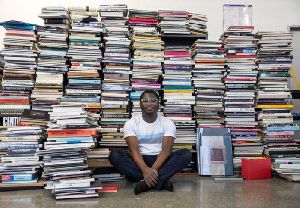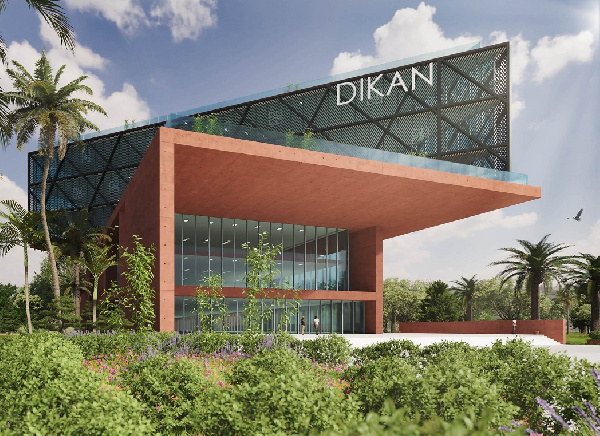 Paul Ninson now lives in New York
Paul Ninson now lives in New York
Young, naïve and uncertain about what he had just brought onto himself, this young man would be thrown into an early life of struggle and pain for the well-being of what he describes as his biggest subject in life; his daughter.
Paul Ninson, a Ghanaian photographer who is currently based in New York got featured on the Humans of New York pages on Facebook and on Instagram, and like many great stories, his story attracted so much attention.
Perhaps, it was the shock of how his early days’ desire to excel in photography was received in Ghana amidst all the rejections he got just by even daring to try to be accepted in the profession.
“‘Show me your body of work.’ All I had were the pictures on my memory card. They were pictures of my life and pictures of my daughter. ‘That is not a body of work,’ she told me. Inside, I could see that meeting was about to start. The photographers were taking their seats. ‘Fine,’ I told her. ‘I’m not a photographer, but I’m here to learn so that I can become a qualified person.’
“But she wouldn’t listen. She closed the gate. ‘I’m sorry,’ she said,” this is how he received one of his biggest rejections as his narration read in part.
It is worth mentioning that on that particular day, the young Paul had travelled all the way from outside Accra – could not sleep the night before because of the joy that filled his heart on the impending meeting of photographers.
For Paul, never hearing of a large group of people like him succeed to that point, he looked forward to that meeting, but as it turned out, he wasn’t quite cut out for it.
While on his way back home that day, completely shattered by the unbelievable smack in the face he had received, he could only muster silence over the phone when he dialed his mother’s number.
“She’d been so excited about the meeting. She’d been praying and praying about it. But when she answered the phone, I could not speak. From my silence, she could tell that I was holding onto my tears.
“‘This won’t be the end for you,’ she said. ‘You are an Apostle. You have so much more to write,'” his mother’s consoling words embraced him at that moment.
Today, Paul Ninson lives in New York, but his story has not been a rosy one at all. It is now one of poise and determination, bravery and a huge dose of many years of prayer investments, and because he was rejected so much, today, his many years of hard work have put him on a path to being etched in history as an achiever – the first of its kind.
With 30,000 books purely on photography on its way to Ghana for a project called Dikan (which translates as ‘take the lead’ in Twi), this young man’s story is changing many narratives.
Like Laila, who recently completed her Master’s Degree in a photography course, the hell she went through in getting references of Africans for her dissertation could have been easily solved if such a library had been available.
But how and when did Paul Ninson decide that this was such a great idea to pursue?
“One morning, I went to photograph a protest in Queens. It was a political protest of some sort, and it was an angry crowd. I think many of the attendees were anti-immigrant. One man got right in my face, waved his poster, and started chanting: ‘Go Home, Go Home.’ In that moment, it became clear to me: I do have a home. This is not my home, but I do have a home.
“After that day, I still worked hard on my schoolwork. But most of my energy went toward building a library in Ghana. I began to speak with booksellers about my vision, and many of them became eager to help. They’d give me discounts. They’d tell their friends about me. I started getting calls from galleries and private collectors, asking if they could make a donation,” he explains.
Besides, as he would narrate, he has not only been rejected in the U.S.; right here in Ghana, in his early years as a photographer, it was almost like he was invisible when he approached people for help.
“Finally, she came to my photos. There were about forty of them. I thought they represented a wide range of my work. But she took one glance and waved them away with her hand. ‘I don’t want to see pictures from Africa,’ she said. ‘I’ve been looking at them my entire career. It’s too much poverty and propaganda.’ At first, I was too embarrassed to speak, but then I grew angry. Were all African stories the same to her? Did they not have value? Because those were the stories I wanted to tell,” he said of his experience in New York during his first meeting with a lecturer he had admired from afar.

He explained further that, “When our workshop was finished, the lecturer showed us a copy of her new book. It was full of pictures of her own life and her own family. She was very proud of it. The price was $50, which was all the money I had. But I bought it anyway. Because I never wanted to forget what she said to me.”
The story has changed, and so have his dreams; Paul Ninson explains:
“I want to build more than just a library. I want to build an entire learning centre — a home for photography in Ghana. I’ve researched the properties. I’ve spoken to architects. I’ve reached out to the appropriate ministries. And I’ve even chosen the name: ‘Dikan.’ Which in our Asante language means: ‘To take the lead.’ The centrepiece will be the library. But there will also be a lecture hall where photographers from all over the world can come and teach.”
In one of his comments under the 12-part series on the Humans of New York page, Ninson wrote, “One frustration that I have had my entire life is that I don’t have more power to help others. Now I do. And I will not let you down. Once the Dikan Center has been completed, all of you will have a second home when you visit Ghana. And to all Americans— for each person who hurt me, there were many more who helped me.”
Etsey Atisu is a trained journalist, writer, and author. He has a deep passion for writing right. He holds a Bachelor of Arts in Communication Studies (Public Relations) from the Ghana Institute of Journalism and has been practicing journalism for close to 12 years. He currently works as a multimedia journalist at GhanaWeb. If he is not writing, he would most probably be talking or singing. He is married to his best friend and they are blessed with an amazing daughter.